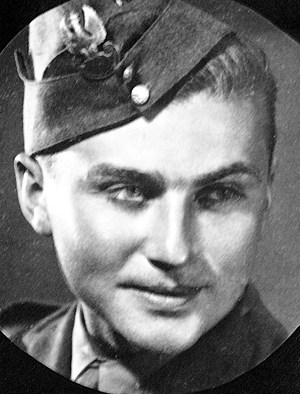
By Frederick N. Rasmussen, The Baltimore Sun
Stanislaw Edward Bask Mostwin, a highly decorated World War II Polish freedom fighter whose exploits were worthy of a Hollywood film, died Monday of arrhythmia at his Ruxton home.
He was 94.
Recalling his years in the underground during World War II, Mr. Mostwin described the experience for the old Sunday Sun Magazine in 1986 as „fantastic, a James Bond life for a young man.”
He added, „You are defending your home. There is no hesitation, you just have to go and do it. The alternative is not to be yourself.”
Mr. Mostwin courted capture and probable death when he parachuted into Nazi-occupied Poland on a mission in 1944 to bring relief and assistance to the underground.
„Stanislaw Mostwin was a freedom fighter, a humanitarian and a true patriot for America and Poland. He was also a true friend,”Sen. Barbara A. Mikulski said in a statement released Thursday evening.
„I admired and respected Stanislaw Mostwin, and I mourn the loss of this dedicated Polish patriot. But his legacy and fighting spirit will live on in Baltimore and Poland,” said Senator Mikulski.
The son of an industrialist and diplomat father and a homemaker mother, he was born Stanislaw Edward Niedbal in Poznan, in western Poland.
He graduated in 1935 from the Gymnasium of Adam Mickiewicz in Poznan, and for the next year, completed cavalry officers school in Grudziadz.
Mr. Mostwin had completed a Master of Law degree and was scheduled to study at Cambridge University in England when German forces invaded Poland on Sept. 1, 1939.
Mr. Mostwin served on the Western Front with Polish forces during the invasion, and when his homeland surrendered he was sent to a military prison camp.
Escaping, he made his way through the Balkans to the Middle East, where he joined the Carpathian Uhlan (cavalry) Divisions in Palestine, then under British command. Wounded during the Battle of Tobruk in North Africa, he recovered and volunteered to become a courier for the Polish government in exile in London.
While being trained by British Intelligence for secret missions as a member of an elite group of military and diplomatic couriers who were known as Cichociemni, or „Silent Shadows” — whose motto was „Loyal to the Vow” — he changed his name to Mostwin, Polish for „bridge.”
„Of the corps of Cichociemni couriers, there were only 29 diplomatic couriers sent back into Poland during the years 1939 to 1945,” said his son, Dr. Jacek Mostwin, a urologist who lives in Ruxton.
„Eighteen diplomatic couriers of the 29 survived. Most were sent with specific intelligence information for delegates of the Polish government in exile and the partisan Home Army, and material relief in the form of paper money and gold,” said Dr. Mostwin.
Four weeks before D-Day, Mr. Mostwin parachuted into Nazi-occupied Poland on May 11, 1944, with important diplomatic information and carrying 200,000 U.S. dollars of relief money for Polish and Dutch Jews imprisoned there.
The night parachute drop landed Mr. Mostwin on the outskirts of Warsaw, where he was hidden in the home of his future wife, Danuta Pietruszewski, who was active in the resistance, and her mother, Irena Pietruszewski, who was an officer in the underground Home Army.
Their home was a shelter and meeting point for the Polish couriers. The couple, who fell in love, were married in 1944.
Recalling his mission to Poland in his wife’s 2000 book, „The Third Value,” Mr. Mostwin described the morning he was preparing to depart from London when a delegation of Jewish members of the Polish National Council came to wish him Godspeed.
„In a moment the delegates entered the room. Their faces filled with emotion and radiant with hope, they placed their trembling hands upon my arms. Their lips, moving in silent prayer, revealed the enormity of their feelings,” he wrote. „I will never forget this image, their lowered tearful eyes, as they prayed for me and for the successful accomplishment of my mission.”
